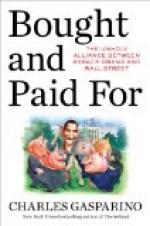“Had any trouble with long distance lately?” he inquired, as he passed her a biscuit.
“Not more than usual,” she smiled.
“Not even with Chicago?”
“No—not even Chicago. It seems to me that I have trouble only when you want the wire.”
He laughed, a loud, boyish laugh, that shook the room.
“We had a hard struggle the first time we tried it, didn’t we?”
“Rather,” she replied.
He looked at her for a few moments without speaking, admiring her large black eyes, the finely arched eyebrows, the delicately chiselled mouth. Then he said:
“You were very patient about it.”
“I couldn’t do the work if I wasn’t patient,” she replied quietly.
“But you were exceptionally nice about it,” he insisted. “It wasn’t the usual external, duty-patience, but the real patience that comes from within. You know what I mean.”
She nodded.
“Yes. My mother was the best example of that kind of patience I have ever known. She radiated it.”
He knew that she had lost her mother, but from feelings of delicacy had never asked for particulars. But now circumstances seemed to invite confidences. Sympathetically he asked:
“How long has she been—gone?”
“Six years,” she replied slowly, looking away past him out of the window, through which she could see the roofs of the big, careless city. Her eyes filled with tears, as she went on: “My father was a lawyer, but he didn’t have a large practice, and when he died he left nothing but his insurance. It was very little—not enough to live on, and mother, with us two girls to look after, had to do something practical, so she opened a small millinery store.”
“The right spirit,” he said approvingly.
“It was a grim, hard struggle, particularly at first,” she went on. “My sister Fanny had left school, and was able to help her, and then it wasn’t quite so trying. You see, Fanny didn’t care for school.”
“But you did?”
“Yes,” she said with enthusiasm, “I always loved it. Mother knew it, and insisted that I should go through High School. I was delighted, for I didn’t realize then what struggles and sacrifices it meant for her, and here is the irony—the tragedy—of it all. I was selected as the class orator at our graduating exercises, and mother was very happy over it. She looked forward to it as one of the days of her life, and started to make my graduating dress—but never finished it!” Very softly she murmured: “Poor mother!”
Never had she looked so pretty as at this moment when, her face pale and thoughtful, her eyes dimmed with tears, she called up memories of the past. Stafford, his gaze intent on her, said gently:
“You have her memory.”
“Yes,” she murmured, “it is more to me than anything in the world—except Fanny.”
“You love your sister, I know,” he said.




